Key takeaways:
- Environmental workshops foster hands-on learning experiences that deepen connections to nature and ignite passion for sustainability.
- Engagement in eco-friendly activities, like crafting from recycled materials, empowers children and encourages creativity while teaching responsibility towards the environment.
- Children’s perspectives during discussions on environmental issues can challenge adults’ habits, highlighting the importance of their voices in advocating for sustainability.
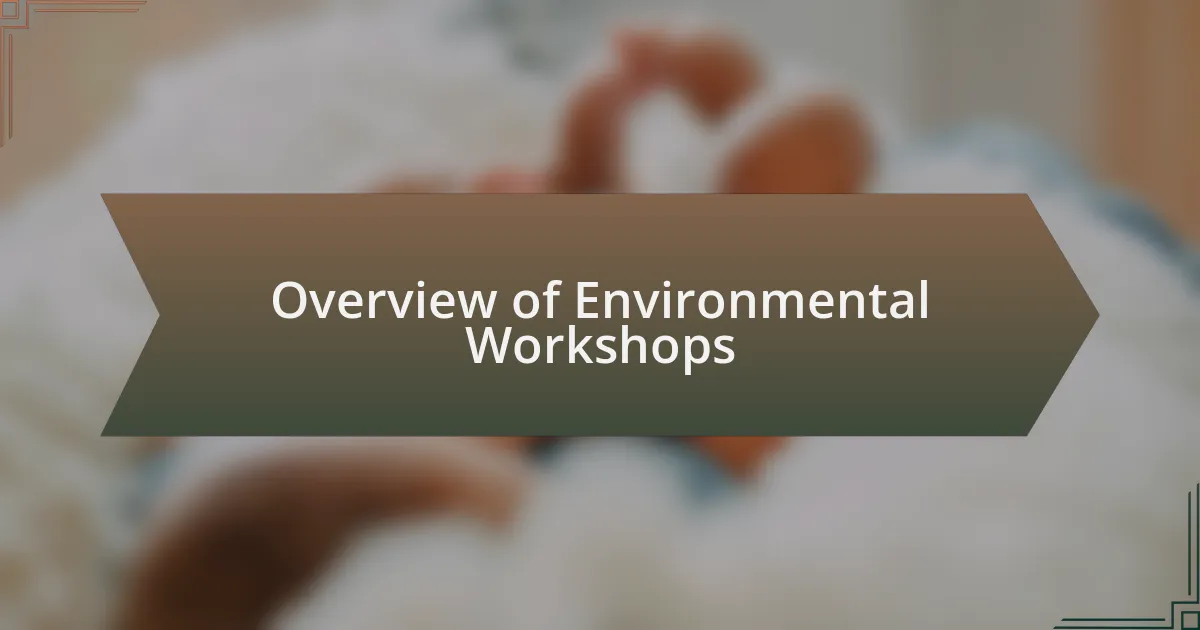
Overview of Environmental Workshops
Environmental workshops provide a unique platform for participants to actively engage with the world around them. I remember my first workshop vividly; we spent a warm afternoon planting trees in a local park. This hands-on experience not only taught me the importance of reforestation but also ignited a passion for environmental conservation that I carry with me today.
In these workshops, there’s often a blend of education and fun, which makes the learning process feel effortless. For example, while exploring the concept of biodiversity, we didn’t just listen to lectures; we examined local ecosystems firsthand and even created our own mini-habitats. Isn’t it fascinating how interactive learning can leave a more lasting impression than traditional methods?
Moreover, the sense of community that grows within these workshops is truly heartwarming. Collaborating with others who share a similar passion for the environment fosters deep connections and encourages a collective commitment to sustainability. Have you ever felt that rush of excitement when you realize that your small actions can contribute to a greater cause? That’s the beauty of what these workshops offer—they inspire and empower participants to become stewards of the Earth.
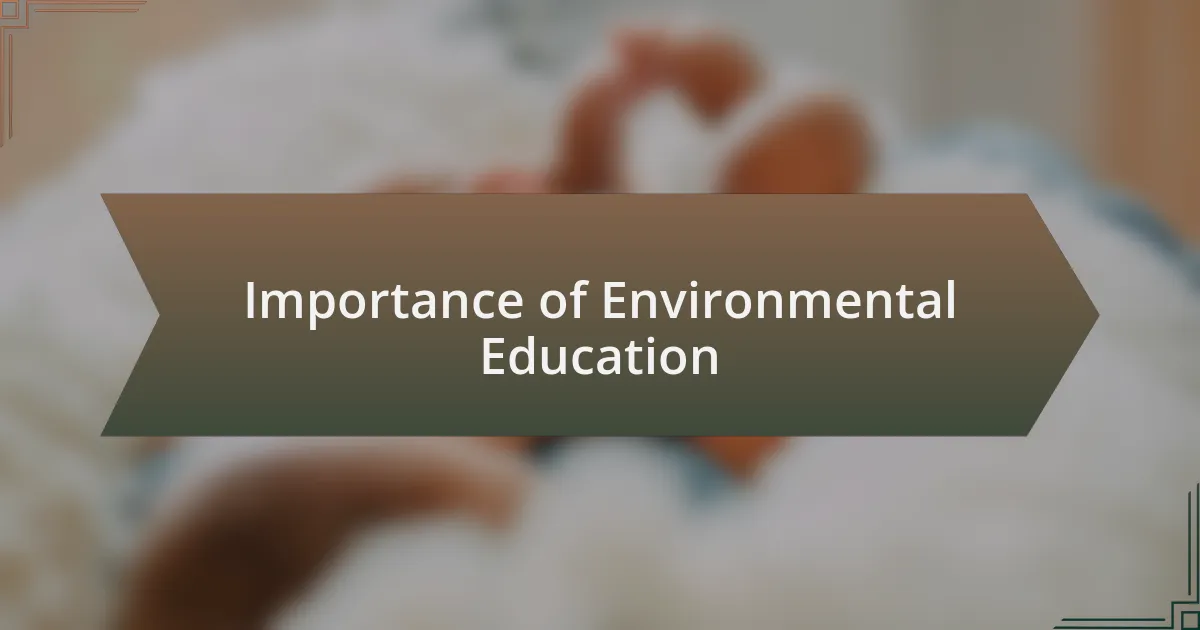
Importance of Environmental Education
Environmental education is crucial because it shapes how we perceive our responsibility towards the planet. I recall a workshop where we discussed the impact of plastic pollution. Hearing the staggering statistics made me realize just how urgent it is to educate ourselves and others about our choices. Don’t you think understanding these issues can inspire genuine change in our habits?
The beauty of environmental education lies in its ability to connect knowledge with action. I once participated in a project where we transformed a neglected area into a community garden. Not only did we learn about sustainable farming practices, but we also tasted the fruits of our labor. Isn’t it rewarding to see your efforts bear fruit—literally and figuratively?
Furthermore, fostering an early appreciation for our environment creates lifelong advocates. I’ve seen children blossom in workshops, as they absorb facts about wildlife and ecosystems, often sparking a curiosity that extends beyond the classroom. When children ask questions about their surroundings, it’s a sign that they’re not just learning; they’re actively caring. How powerful is that?
Role of Children’s Discovery Center
The Children’s Discovery Center plays a pivotal role in nurturing environmental awareness among young minds. I remember the first time I walked into one of their workshops—it was full of excited chatter, with children eagerly sharing their thoughts on the importance of protecting nature. This vibrant atmosphere ignited a sense of responsibility in the kids, fostering a community where environmental discussions flourish.
In these workshops, educators don’t just present facts; they create experiences that resonate deeper than traditional learning methods. For example, during a hands-on activity about recycling, I watched children sort materials with zeal, laughing as they discovered what could be reused. Isn’t it incredible how engaging activities can transform learning into a fun adventure and inspire a lifelong connection to the environment?
Moreover, the center acts as a bridge between exploration and action, empowering children to make a difference in their communities. I recall a project where the kids organized a neighborhood cleanup day. Their enthusiasm was contagious, and the pride they felt afterward was unmistakable. Don’t you think this sense of accomplishment not only helps the planet but also fosters leadership skills that will benefit them for years to come?

Types of Activities Offered
The Children’s Discovery Center offers a wide range of engaging activities designed to foster environmental stewardship. One particularly memorable event was a nature scavenger hunt, where kids explored the outdoor area, searching for specific leaves, rocks, and insects. Watching their faces light up with excitement as they discovered something new was incredibly rewarding for me; it highlighted how hands-on experiences can deepen their connection with nature.
Another unique activity involves creating art from recycled materials. I recall guiding a session where children transformed plastic bottles into colorful planters. The joy on their faces as they crafted something beautiful from what could have been waste was genuinely inspiring. It made me realize how creativity can breathe new life into discarded items, encouraging kids to view trash through a different lens.
Workshops often incorporate interactive storytelling, where environmental themes come alive through engaging narratives. I remember a session where the educator led the children through a tale of a struggling sea turtle facing the challenges of pollution. The heartfelt discussions that followed allowed the kids to express their empathy and brainstorm solutions. Isn’t it fascinating how stories can evoke emotions and prompt critical thinking in such a dynamic way?
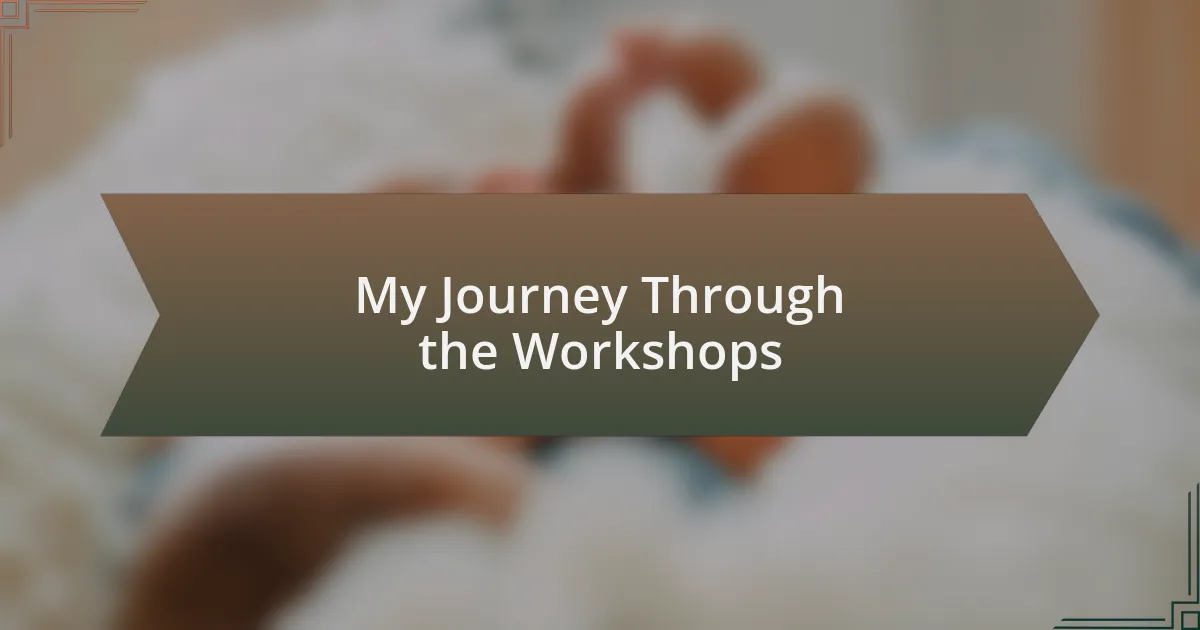
My Journey Through the Workshops
As I dove deeper into the workshops, I found myself particularly drawn to the sessions on sustainable gardening. One day, while planting seeds with a group of eager children, I felt a real sense of connection—not just to the earth, but to each of them. Their curiosity as they questioned how plants grow made me reflect on my own childhood curiosity and the importance of nurturing that spark in young minds.
During another workshop, we explored the concept of water conservation through experiments. I remember watching the kids’ eyes widen as they learned how much water is wasted with a running tap. Their suggestions for saving water—like turning it off while brushing teeth—were so insightful. I couldn’t help but think, how often do we, as adults, overlook these simple yet impactful actions?
One of my most cherished moments was facilitating a group discussion about local wildlife. As the kids passionately debated the importance of protecting their neighborhood habitats, I felt a rush of hope for the future. It made me wonder: who will be the environment’s next champion? Their enthusiasm reminded me that these workshops aren’t just about teaching; they’re about igniting a lifelong passion for environmental advocacy.
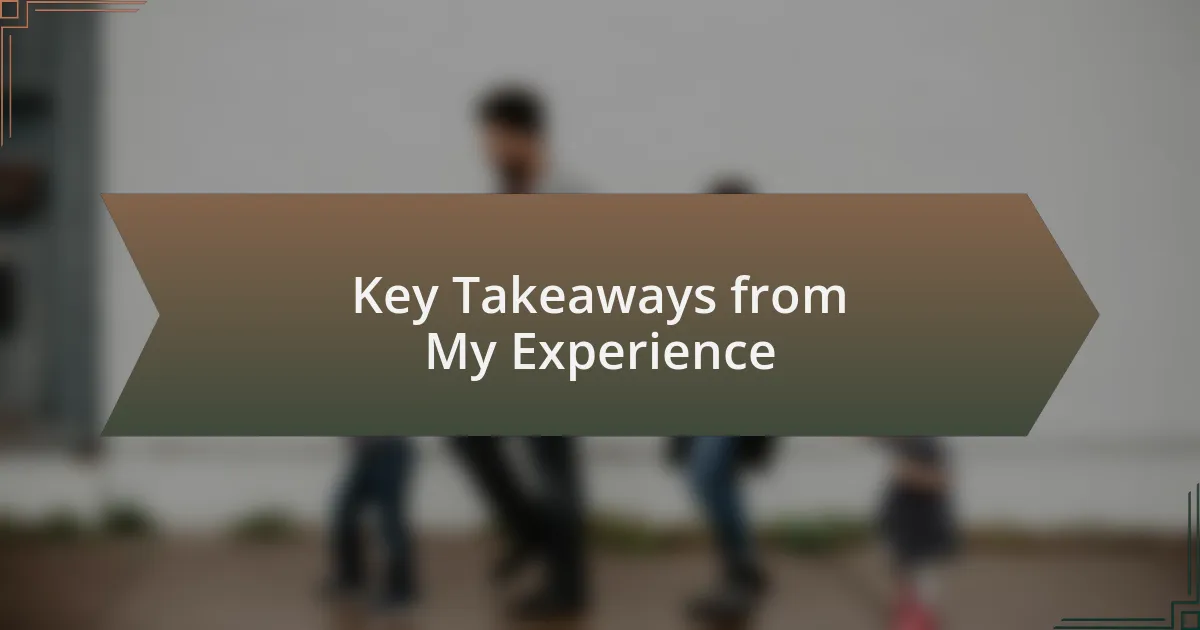
Key Takeaways from My Experience
One of the key takeaways from my experience in the workshops was the power of hands-on learning. I vividly recall a moment when we crafted bird feeders from recycled materials. The joy on the children’s faces as they created something beneficial for local wildlife was truly heartwarming. It made me realize that engaging directly with nature not only fosters creativity but also instills a profound sense of responsibility towards the environment.
Another significant lesson emerged during a session focused on the impact of pollution. We conducted a simple experiment with different soil samples, and the reactions of the kids upon discovering how pollution affects plant growth were unforgettable. Their faces showed genuine concern, and it struck me how transformative these experiences were in shaping their understanding of the world. I began to wonder: how can we make such crucial lessons even more accessible and impactful for future generations?
Perhaps the most enlightening aspect of these workshops was witnessing the children’s ability to connect ecological concepts to their own lives. During a talk about climate change, one child offered a heartfelt suggestion about reducing plastic usage at home. It reminded me that the insights we often overlook can come from the purest sources—children. Their unfiltered perspectives not only challenge adults to rethink habits but also serve as powerful lessons in advocating for sustainable living.
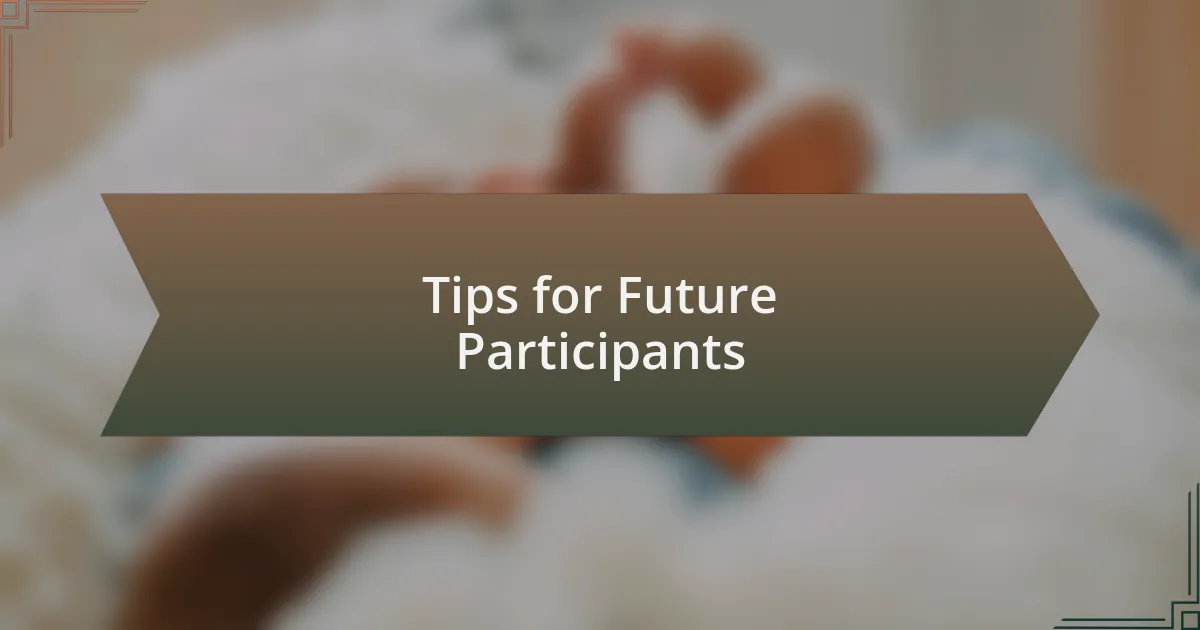
Tips for Future Participants
When preparing for an environmental workshop, come ready to engage all your senses. I remember one session where I wore comfortable clothes that allowed me to easily climb trees and get my hands dirty. Being physically involved not only enhanced my experience but also made me feel more connected to the activities, and I encourage future participants to embrace this idea.
Don’t hesitate to share your thoughts and questions during the workshop. I found that every time I contributed to the discussion, not only did I learn something new, but I also inspired others to think more deeply about the topics at hand. Have you ever had a moment where you felt your voice added value to a conversation? In these workshops, even the simplest questions can lead to profound discussions, so speak up!
Lastly, be open to making connections with both the facilitators and fellow participants. I recall forming a lasting friendship with someone who shared my passion for environmental advocacy during one of these sessions. We still exchange ideas and updates on our projects. Who knows? The person sitting next to you might be your next collaborator, so take the leap to introduce yourself and start a meaningful conversation.